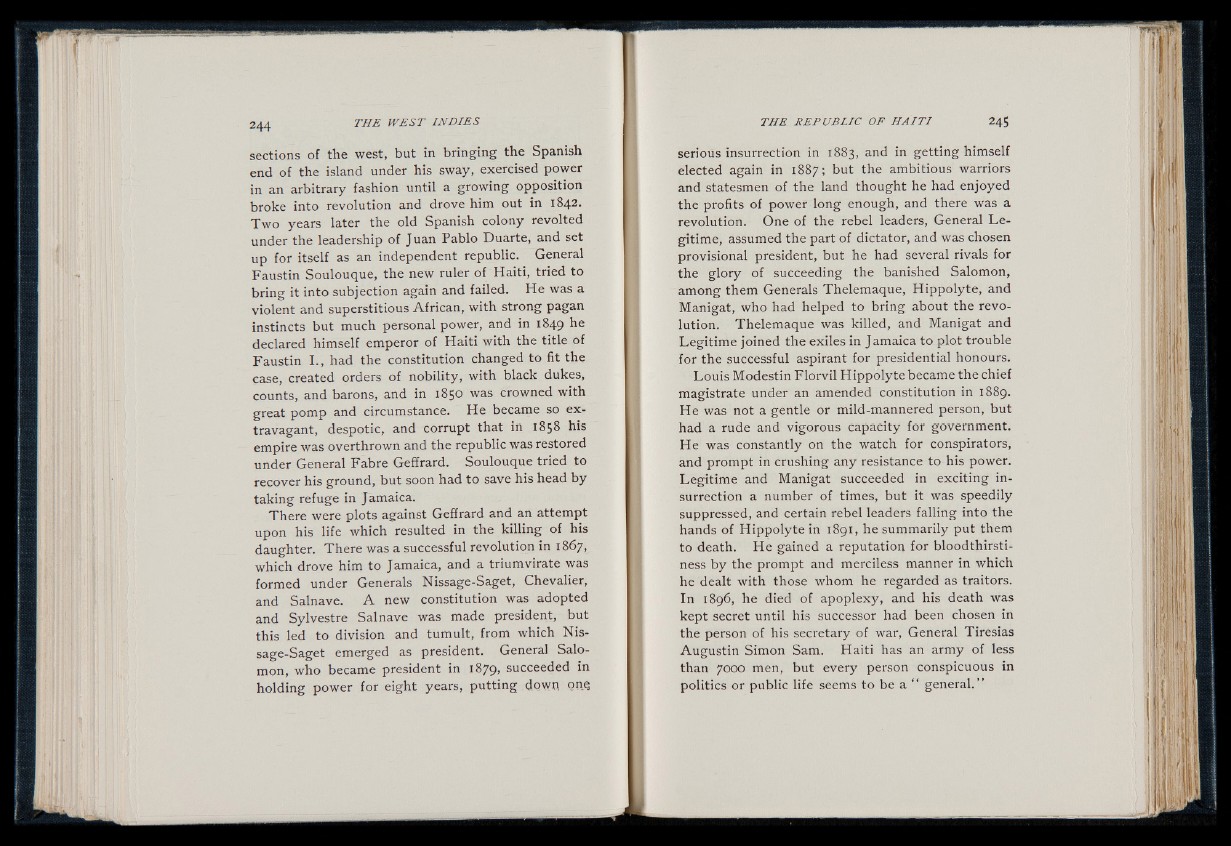
sections of the west, but in bringing the Spanish
end of the island under his sway, exercised power
in an arbitrary fashion until a growing opposition
broke into revolution and drove him out in 1842.
Two years later the old Spanish colony revolted
under the leadership of Juan Pablo Duarte, and set
up for itself as an independent republic. General
Faustin Soulouque, the new ruler of Haiti, tried to
bring it into subjection again and failed. He was a
violent and superstitious African, with strong pagan
instincts but much personal power, and in 1849 he
declared himself emperor of Haiti with the title of
Faustin I ., had the constitution changed to fit the
case, created orders of nobility, with black dukes,
counts, and barons, and in 1850 was crowned with
great pomp and circumstance. He became so e x travagant,
despotic, and corrupt that in 1858 his
empire was overthrown and the republic was restored
under General Fabre Geffrard. Soulouque tried to
recover his ground, but soon had to save his head by
taking refuge in Jamaica.
There were plots against Geffrard and an attempt
upon his life which resulted in the killing of his
daughter. There was a successful revolution in 1867,
which drove him to Jamaica, and a triumvirate was
formed under Generals Nissage-Saget, Chevalier,
and Salnave. A new constitution was adopted
and Sylvestre Salnave was made president, but
this led to division and tumult, from which Nis-
sage-Saget emerged as president. General Salomon,
who became president in 1879, succeeded in
holding power for eight years, putting down QIV»
serious insurrection in 1883, and in getting himself
elected again in 1887; but the ambitious warriors
and statesmen of the land thought he had enjoyed
the profits of power long enough, and there was a
revolution. One of the rebel leaders, General L e gitime,
assumed the part of dictator, and was chosen
provisional president, but he had several rivals for
the glory of succeeding the banished Salomon,
among them Generals Thelemaque, Hippolyte, and
Manigat, who had helped to bring about the revolution.
Thelemaque was killed, and Manigat and
Legitime joined the exiles in Jamaica to plot trouble
for the successful aspirant for presidential honours.
Louis Modestin Florvil Hippolyte became the chief
magistrate under an amended constitution in 1889.
He was not a gentle or mild-mannered person, but
had a rude and vigorous capacity for government.
He was constantly on the watch for conspirators,
and prompt in crushing any resistance to his power.
Legitime and Manigat succeeded in exciting insurrection
a number of times, but it was speedily
suppressed, and certain rebel leaders falling into the
hands of Hippolyte in 1891, he summarily put them
to death. He gained a reputation for bloodthirstiness
by the prompt and merciless manner in which
he dealt with those whom he regarded as traitors.
In 1896, he died of apoplexy, and his death was
kept secret until his successor had been chosen in
the person of his secretary of war, General Tiresias
Augustin Simon Sam. Haiti has an army of less
than 7000 men, but every person conspicuous in
politics or public life seems to be a “ general.”